- Home
- Mark Lawrence
One Word Kill (Impossible Times Book 1) Page 2
One Word Kill (Impossible Times Book 1) Read online
Page 2
Simon was already setting the figures back up amid the sprawl of character sheets and maps, his hands remarkably delicate. Somehow, I always expected Simon’s hands to be as fat and clumsy as the rest of him, but the boy could be a brain surgeon one day. He reconstructed the scene with perfect accuracy, muttering reminders to himself. Simon never forgot a thing. He knew pi to more decimal places than any sane person would want to. I sometimes joked that it was an irrational feat of memory. A maths joke. Nobody ever got it.
‘Roll already!’ Elton arched an eyebrow at me. I knew the expression. It was often followed by a demonstration of a karate move where Elton would talk you through the attack as he put you on your arse in slow motion. Even at quarter speed there wasn’t much you could do about it. Elton knew his stuff. His oldest brother was a black belt and the other three were heading in that direction. All five of them lived in the tiny flat their parents had managed to secure after getting off the boat from Madagascar. Five was too many for the place. With their parents, there were seven of them.
Still confused, I reached for the twenty-sided die.
‘D6!’ Simon thrust a handful of six-sided dice at me. Focused, impatient. ‘Damage roll.’
‘Get with the programme, Nick.’ John leaned his chair back on two legs, showing that easy grin of his. ‘No daydreaming on the job!’
‘But . . .’ I looked around the room. Simon’s bedroom, crowded with books and collectables. Fantasy and science fiction novels, and a shameful section on trains that Simon clung on to despite the fact that even Dungeons & Dragons nerds thought those were deeply uncool. ‘But . . .’ My hand tightened around the dice. I squeezed until the corners bit, trying to shake myself out of this dream. ‘I’ve been here before. Done this before.’
‘Yes . . .’ said Elton. ‘The last time you cast a fireball on a bunch of monsters. Roll the damn damage.’
‘I mean . . . this is last week.’
‘Hah!’ John’s one annoying habit was that he spoke his laughs. He didn’t laugh like a normal person . . . he said ‘hah’. It made me less willing to trust him. Laughter should be unguarded even if nothing else is. ‘You’re pulling a Back to the Future on us!’
‘N-no.’ Simon always stuttered when building up to a joke. ‘H-he’s the Terminator.’
‘Sent from the future to kill us!’ Elton grinned. He did the Schwarzenegger voice. ‘Give me your clothes!’ A wider grin as he brushed imaginary dust off his shoulder. ‘Dream on, boy. You can’t touch this. It’s called style.’
‘I was in an oncology ward . . .’
‘Onk-what-ogy?’ John snorted.
‘Ward?’ Simon frowned. ‘Like a hospital?’
‘Cancer.’ A scowl from Elton. ‘Not cool, dude. That shit’s not funny.’
‘I’ll prove it! I’ll . . .’ The dice fell from my hand and I sat down. I grabbed a pen, and while the others leaned over to add up the numbers I’d rolled, I pushed aside the edge of the gaming mat and began to write, pressing hard enough to score the polished wood.
‘That’s you done, Nicky.’
‘What?’ I blinked. The pretty nurse, Lisa, was reaching for my arm. I snatched it away.
‘Easy.’ She smiled. ‘You’re done. The needle can come out now.’ She started to unwind the gauze below my elbow. Above her head, the chemo bag, once pregnant with venom like the sacs behind a snake’s fangs, hung flaccid, drained of all but a few yellow drops. ‘Where did you wander off to then?’
‘Sorry?’
‘Away with the pixies, you were. Gazing up there somewhere.’ She unwound the last turn and took hold of the needle, ready with a square of cotton wool for any bleeding.
‘Last week. I was last week.’ I stiffened as the needle came out. It stung rather than hurt, but the sensation was unpleasant. ‘Does this stuff give you nightmares?’
Lisa pursed her lips and straightened up. ‘A lot of children get bad dreams in hospital. Don’t worry about it. We’ll be checking on you through the night to make sure you’re not having a bad reaction. You can press the call button if you feel sick. There are medicines we can give you.’
‘Medicines for the medicine.’ I blinked. Part of me hadn’t quite left Simon’s room yet. I could still feel the impression of the pen on my fingers. I looked down, expecting to find them inky, but they were clean. ‘I mean, can you get hallucinations and stuff?’
Lisa shook her head. She had her hair tied up. ‘Don’t you worry about any of that, Nicky. You’ll be fine.’
She walked away with the bundled gauze and needle on her tray. I watched her go.
A modest increase in the windowless ward’s general brightness and clatter signalled the arrival of morning, along with a dawn chorus of greetings at the nurses’ station as the night shift swapped with the day shift. I rolled over, bleary-eyed and tangled in my sheets. I felt sore, as if I really had spent the night running from myself down endless corridors, rather than just having had a rather unimaginative dream.
I’d slept badly. The pain in my joints, the agony that lanced without warning along the bones of my arms and legs, had kept lifting me from the shallow pit of my dreams. When the aching had first started, Mother had said they were growing pains and that most boys got them if they decided to gain a foot in height in a year. The growing pains kept growing, though. They were the symptoms that had taken me to the local doctor’s office to be dismissed and then marched back again three weeks later behind my indignant mother. At that point they had humoured us with an appointment at the hospital for ‘tests’.
After that first long chemo night my mother arrived promptly at nine, for visiting hours. The parents flowed in and she entered midstream. Where curiosity had other mothers and fathers rubbernecking all the way down the ward, Mother kept her gaze pinned to me, refusing to look at the other children.
‘How are you feeling, dear?’
‘I . . . I don’t know.’ I saw her face tense. ‘Fine!’ I said. Her eyebrows arched. ‘Not too bad.’ I settled for something close to the truth. ‘Strange.’
‘They said to expect nausea at some point.’ Her eyes flickered to the sick bowl on my table. ‘And the hair loss, of course.’ She looked up at my fringe as if expecting to see it thinning. As if the unruly mop that had been riding about on my head for fifteen years might just have been waiting all this time for an excuse to leave and would slide off at the first opportunity.
‘Who was that man you were talking to in the corridor last night?’
‘What man?’ She looked guilty at once. I’d never seen her look guilty before. Except maybe when she told me the train had killed my father instantly. I read in the local newspaper that he had been struck a glancing blow and died in hospital that night. That always bothered me. He’d chosen to end it quickly and failed, even with the help of a train. As if when the universe gave him his cancer it was determined that he suffer, one way or the other.
‘The tall guy, bald.’ I touched my hair. ‘And why were you here so late?’
‘I forgot something. Had to come back.’ She waved down the nurse passing the end of my bed. ‘Is Nicholas going to be allowed home today?’
‘The doctors have been through, looked at the notes. Everything’s fine.’ A smile full of professional optimism. ‘You can take Nicholas home whenever he feels ready. We’ll be sending you confirmation of his next appointment, same time next week – another overnight stay, I’m afraid.’
‘Well, that’s excellent.’ Mother echoed the woman’s smile and turned to me. ‘Ready to go?’
And that was that. Five minutes later I was walking out of there into the big wide world as if nothing had happened and my veins weren’t full of toxin and I hadn’t left behind half a dozen dying children who looked like those bodies in the concentration camp footage they showed us in history class. Eva had to stay. At least until she could keep fluids down, they said. I stopped at the end of her bed to say goodbye. She looked sick, but she was back to voicing every thought that ran through
her head, even with her parents on either side.
‘Uh. See you next week, I guess.’ I felt I should do something. Maybe reach out and pat her foot where it tented the sheet close by. But I didn’t. Not with her mother and father looking at me, accusation in their eyes. Why aren’t you sick, too?
Eva managed a smile. ‘I’ll see you next week. I hadn’t thought of that. We’ll be seeing each other every time now. We’re . . . what’s the word? Syncrotised? This is my mum and dad. See you, Nick! See you!’ She kept talking as I followed Mother out, as if the conversation were a rope and if she only kept it unbroken I would be held by it, unable to leave.
It’s always a shock, when you’ve been hit by some calamity, to see the world go about its business with perfect indifference. When Elvis dies, when Charles marries Diana, you feel you’re part of things, that everyone is moved by the same current, even if they really don’t want to be. But turn that around and you discover that your father dying or your blood turning against you doesn’t make the slightest impact. Not only does the world keep turning and the birds keep singing, but the buses run, people scurry to work bound about with their own cares, and the man in the corner shop still snarls at you as if taking your money is a great imposition.
We drove home through the Friday pre-lunch traffic. There’s no good time to drive in London, just less-worse times. The others would be at school. Second day back. The others. As if I were still part of them, not a modern-day leper with a soon-to-be-shiny scalp and a drip stand in place of sores and a bell that tolls ‘Unclean! Unclean!’ It doesn’t matter what the doctors say, there’s no fatal disease that doesn’t feel contagious to the person sitting next to you.
John and Simon went to the same school as me, Maylert, a private school nestled up against the banks of the Thames. You didn’t have to be rich to go there, just not poor. Some were rich, though. John’s grandfather had been a lord! His father did something in the city. Shovelling money into buckets by the look of the Richmond mansion they lived in. Simon’s parents weren’t rich, a teacher and a university lecturer, but they stumped up the fees so that Simon would get beaten less viciously and by a better class of bully. Simon had ‘victim’ written all over him: overweight, obsessive, and blessed with a set of social graces that made me look suave.
Elton went to some dangerous-sounding comprehensive not far from Simon’s house. We all professed to envy him as, unlike Maylert, his was a mixed school and girls made up half of every class. While that was an education we were all sorely in need of, in truth only John stood a chance of securing a girlfriend, unless studiously ignoring a girl and awkward silences really were the key to the art of seduction.
‘What do you want for lunch?’ Mother’s voice was a fraction too bright, a touch brittle. She never made me lunch. I heated up a tin of mushroom soup. Or forgot to heat one up and wondered later why I was hungry.
‘Soup?’ I wanted to say that I wanted my life back. Instead, I trekked upstairs to my bedroom and fell onto the bed that I’d grown up sleeping in. Once it had been a three-year-old Nicky who bounced onto his first ‘big boy bed’, now an over-tall fifteen-year-old, too skinny, all sharp elbows and greasy hair, folded onto the much-punished mattress and stared at the ceiling. I lay there trying to ignore the dull ache of my hips and wrists. Too many thoughts tried to crowd in at once, with the net effect that none of them managed to get a space.
The next thing I knew it was dark. I sat up disoriented and a blanket slid from me. My bed. Still my bed.
A sharp noise broke the darkness. A pebble against the window. I stumbled across the room and flicked the light switch. My room. As I left it. A bowl of cold soup the only addition. I flicked the light back off and went to the window. Two figures stood at the base of the nearest streetlight in the pooled sodium glow. The taller one was John. He waved.
A minute later I was leaving the front door, zipping my parka as I went.
‘That was quick! Sleep in your clothes?’
‘Something like that.’ I looked past him. The girl was still leaning against the lamppost, breath pluming before her. She had black hair, short-ish, a black coat, pale skin. ‘What time is it?’
‘Coming up to midnight maybe.’ John shrugged. ‘Thought we’d come check on you. Nicky Hayes doesn’t miss school two days in a row unless he’s dying.’ He glanced back at the girl. ‘He look dead to you, Mia?’ He’d dialled his accent back to as close to common as it would go. Which wasn’t very close, but a one-eighty from the upper-crust drawl he used at school.
Mia looked at me as if John’s question weren’t rhetorical. ‘Some life left in him yet, probably.’ She was Elton’s friend. Our first and last encounter had been two weeks ago when he brought her unannounced to Simon’s house for the D&D session. Simon and I had gone into shock, unable to utter more than grunts, as if we were on stage in a school drama lesson waiting for the mockery. It had been the worst session ever. What she was doing with John, I had no idea. I kept staring from her to him like an idiot, trying to imagine how he had got her number. And then, armed with that, how he had had the superhuman courage to call her.
‘We’re going down by the river.’ John pulled a can of Fosters from his coat and pushed it at me. ‘Come on, we’ll puff some weed.’ He mimed drawing on a joint.
I took the can, finding it warmer than expected. ‘I guess.’ My stomach growled, a hollow hunger gnawing at me. I thought of the cold mushroom soup and felt nauseous.
John led the way. If you say ‘the river’ in Richmond you mean the Thames, the broad grey-green expanse of water that slides its way through London. Unless you’re John, in which case you mean Beverly Brook. It’s a stream that hurries across Richmond Park. And if ‘the river’ is too big a name for the brook, then ‘the park’ is too small a name for Richmond Park, which, rather than being two football fields and some swings, is a proper seventh-century hunting reserve with accompanying deer, whittled down to a square mile of forest and field amid the tight-packed chaos of the city.
At the park’s Wessex Road gates, a cruel hand reached in to twist my guts. Before I knew it, I was doubled up by the fence with one hand clutching the iron bars. I retched and retched again, acid burning my throat, spitting drool at the base of the gatepost.
‘Shit, you were ill!’ John backed away.
‘I’ll be OK.’ I straightened up. I felt like crap, my mouth watering, hands trembling. Never let it be said that I don’t know how to make a good impression with the ladies. ‘Come on.’
We came to the dirty bank along a wooded path so dark I could barely see the trees. Without the pervasive London glow, even following the path would have been impossible. I hobbled along, wincing at the shooting pains in the long bones of my legs. It’s amazing how much harder it is to dismiss a discomfort when someone changes the label on it from ‘growing pains’ to ‘leukaemia’. Mia walked ahead beside John and they exchanged a mutter every so often. Sleep still had its last hooks in me, and their words floated under my hearing, incomprehensible.
‘That’s a brook?’ Mia seemed unimpressed by the few black yards of water between us and the bushes on the other side.
‘In America they’d call it a creek.’ John had been to the States for his two previous summers. Perhaps he was unconscious of how quickly he referenced that fact in any conversation. He rummaged in his coat pocket again and brought out what looked like a cigarette with a middle-aged spread.
‘You don’t smoke,’ I said.
‘It’s herb, man.’ John sounded like what he was, a posh boy trying to impersonate a Rasta, and failing badly.
‘I thought you were joking.’ The words escaped me before I realised how many cool points I had just blown away in front of the only girl I knew. ‘Did Elton . . . ?’
‘Don’t be stupid.’ John snorted.
‘Elton’s dad would kill him if he touched this stuff.’ Mia smiled. ‘His mum, too. And his brothers. John bought it off me. I know a guy.’ She shrugged.
‘I
. . . don’t have a light.’ John patted his chest as if a cigarette lighter or matches were the sort of thing he might reasonably expect to find in his inner pocket.
Mia sighed and produced a flame from a silver lighter, cupping it with her other hand.
The glowing tip of John’s joint tracked toward his face. He put the cold end to his lips and puffed a great cloud of smoke. ‘Great.’ He creaked the word through his effort to suppress a cough and offered the joint to me. ‘Try it.’
John’s look of amazement when I actually took it was comical.
The voices of a dozen responsible adults rose along with the hand lifting it toward my mouth. Their protests rang in the back of my mind: Mrs Green, a favourite teacher in my second year, shrill, denouncing; Mother, stern and disappointed; Mr Stanley from chess club, disapproving. I blocked them out. I had cancer. The biggest C. Why not live a little? Taste what was on offer before the fates swept it all beyond my reach.
I put my lips where John’s had been and inhaled. I might not have smoked, but I knew how to do it. Smoke filled my lungs like cool fire. I held it there until a tickle sprang up and became a demand and I coughed it out.
‘Easy, Nicky-boy!’ John never talked like that. This was for Mia. He slapped my back hard enough to stagger me toward the water.
I caught a foot on a root and almost pitched into the brook but managed to regain my balance with nothing worse than muddy shoes. Coughing, I went back, something angry on my tongue . . . but the figure standing on the path stole away whatever I was going to say.
‘There’s someone back there,’ I said, not taking my eyes from the black shape in the shadows.
John shrugged and passed the red ember of the joint to Mia. ‘It’s a free country.’
‘You see him, though?’ It didn’t feel right: the man on our path, motionless, watching, made monstrous by the inky tree-haunted spaces around him.

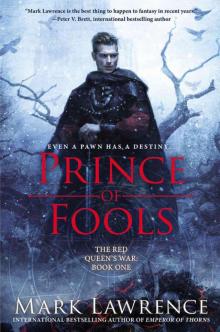 Prince of Fools
Prince of Fools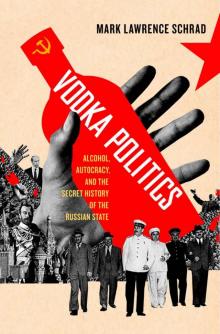 Vodka Politics: Alcohol, Autocracy, and the Secret History of the Russian State
Vodka Politics: Alcohol, Autocracy, and the Secret History of the Russian State Holy Sister
Holy Sister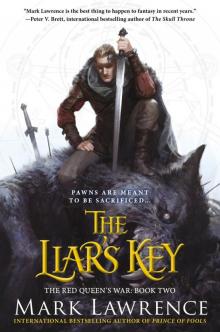 The Liar's Key
The Liar's Key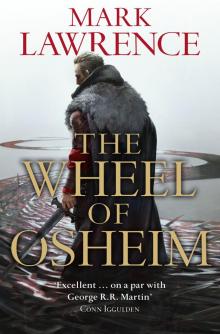 The Wheel of Osheim
The Wheel of Osheim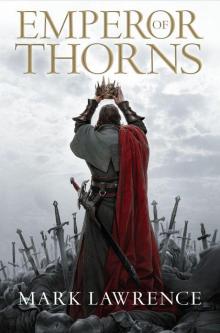 Emperor of Thorns
Emperor of Thorns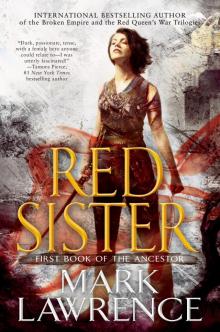 Red Sister
Red Sister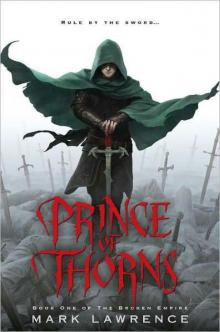 Prince of Thorns
Prince of Thorns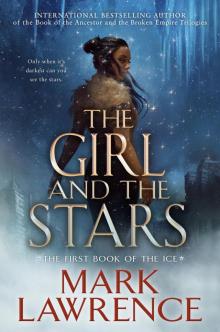 The Girl and the Stars
The Girl and the Stars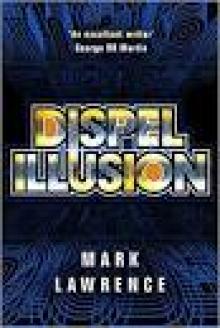 Dispel Illusion (Impossible Times)
Dispel Illusion (Impossible Times)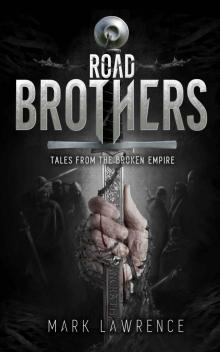 Road Brothers
Road Brothers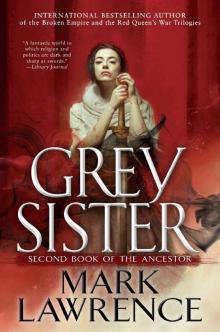 Grey Sister
Grey Sister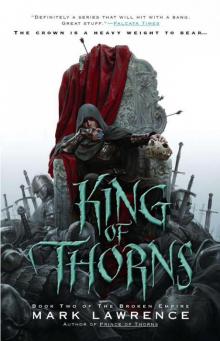 King of Thorns
King of Thorns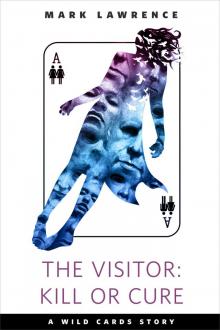 The Visitor--Kill or Cure--A Tor.com Original
The Visitor--Kill or Cure--A Tor.com Original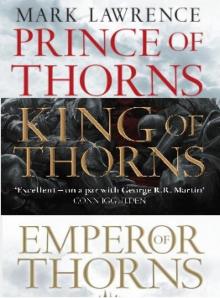 The Broken Empire Trilogy Omnibus
The Broken Empire Trilogy Omnibus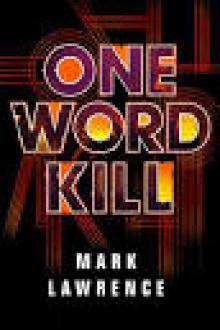 One Word Kill (Impossible Times Book 1)
One Word Kill (Impossible Times Book 1)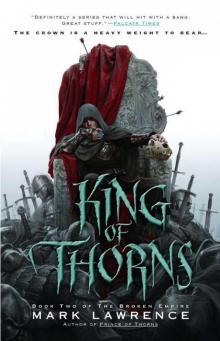 King of Thorns be-2
King of Thorns be-2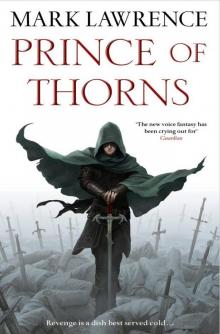 Prince of Thorns tbe-1
Prince of Thorns tbe-1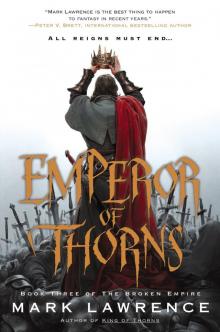 Emperor of Thorns tbe-3
Emperor of Thorns tbe-3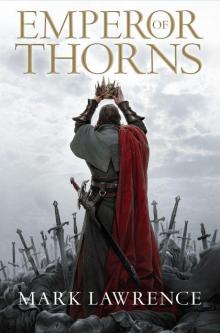 Emperor of Thorns (The Broken Empire, Book 3)
Emperor of Thorns (The Broken Empire, Book 3)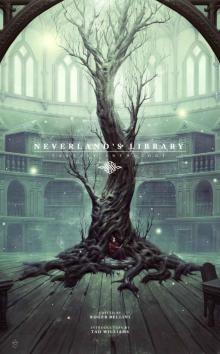 Neverland's Library: Fantasy Anthology
Neverland's Library: Fantasy Anthology